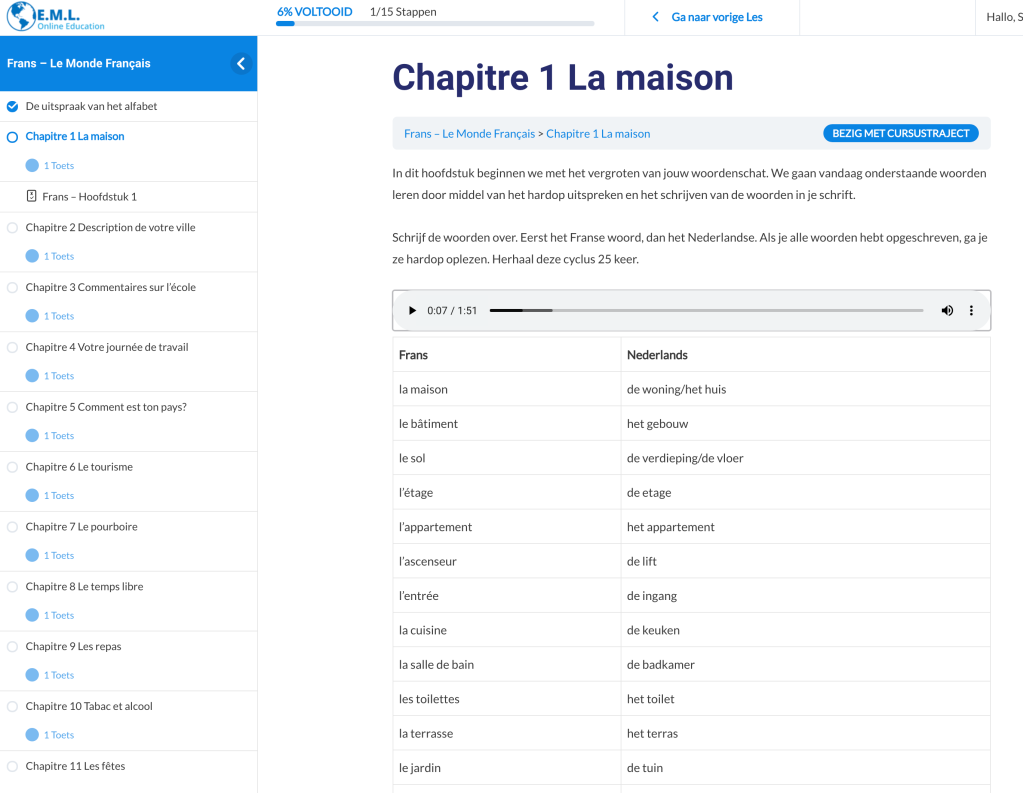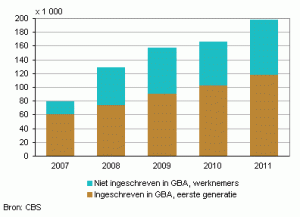A few weeks ago I received an opportunity to pay a bargain price for learning French online. I studied this language many-many years ago (several decades ago, actually) so, even though I travelled around France for a month afterwards, I’ve practically forgotten all of it since so I jumped to this chance, partly because I usually have some spare time since I’m a half-time pensioner.
The huge price reduction warned me to be cautiously optimistic but, for a few dozen euros, one tends to say, well, damn it, why not give it a try. I did. Then I was steered to this site, which shows several other opportunities for bargain prices, at least for two days for me as their existing customer. I have no idea in which countries this company’s offers are available apart from the Netherlands but, even though so far this seems to be like an advertisement for them, be aware: this is anything but!!!
The course begins with the pronunciation of the alphabet, which is not completely without logic as pronouncing some French letters could be tricky but it all misses the fact that it’s a lot more difficult to pronounce certain combinations. But small matter, with some memories of long ago, it wasn’t difficult, I went on to the second ‘chapter’ or ‘lesson’, whatever you’d care to call it. There are 15 of them altogether, which was a bit of a warning as well, although they seem to cover reasonable topics.
However, what awaited me in the second ‘lesson’ was far worse than any nightmare I might have anticipated. Here is a screenshot of the top of the page:

Words. After one scrolls dawn, more words. Sometimes a phrase (‘Comment tu t’appelles ?’, ‘Bonjour, agréable de vous rencontrer’ and a few similar basic phrases), but a vast majority simply words. Which would be fine at the beginning of a beginner’s course, except that we’re supposed to repeat them (as the Dutch command above the sound bar says) 25 times and perhaps remember them, which is useless in any case because, as language teachers, and probably students also, are already well aware, a word in itself is a lot more difficult to remember without a context than in a sentence, and it doesn’t do much to convey what we want to communicate anyway.
The worst of it, however, is the reading of the word list. The words on the left side are fired at the learner at an enormous pace, like from a machine gun, by an otherwise nice female reader. Natural pronunciation as far as individual words can be but when about a hundred words are pronounced within exactly 1 minute and 52 seconds, how much time do you have to repeat the words (phrases) after her and also pay attention to the meaning? And what is the value of saying something, albeit well and however many times, if you have next to no idea what you’re saying?
OK, so you want to pause the sound to have some time to have a look and understand. Fine. At least down to the 20th word. Then you need to scroll down. Ah, there’s the rub: the voice slider disappears under the heading of the page (the part with the ‘Hello’ in the top right corner, and everything to the left of it). And this was only the first 20 words. You can scroll back up to stop the sound for a second, then scroll back down to control yourself and the meaning, but how easy is that when you’re down in the second, third, fourth or fifth 20 words/phrases? What can be more embarrassing? And how much time does it take to scroll half a meter down and back up on a 15-20-cm screen at least 50 times, just to go through the whole list once? Let alone do the whole thing 25 times as suggested by the authors. And while the French single words appear on the left side, the phrases suddenly pop over to the right. But the most ridiculous thing about all this is that with a simple change in the programme, they could have allowed the sound bar on top so that you could at least pause it while you’re checking any of the 80 remaining items where you need to scroll up and down crazy now. While also changing sides.
And when – and if! – you’ve done that, and if you’re lucky, you’ll remember individual words. You won’t be able to say anything properly, mind you – this is still only a list of individual words (and a few greetings).
Afterwards, you’re only allowed to proceed to the next ‘lesson’ if you do a test. This is a multiple-choice test, where you have to find the meaning of a word in your language among four French options. Ten items altogether, like this one here.

And if you retake the test, the order of the items is always the same – which is a simply avoidable mistake from the dark ages of online courses, which other programmes, like Byki Deluxe or Google Tests, solved two decades ago. But, most importantly, remember: the list consisted of about 100 items. So what about the remaining 90? Do you remember them as well? Who cares – the authors definitely don’t.
That done, you’re through to the next ‘lesson’, which has fewer words in the second topic but the voice recording is also shorter. Unfortunately, however, it consists again of words and some simple phrases, without context. And let’s not forget, the check-back was to find the equivalent of the original word among 4 options in the target language – no check-back whether you could say anything on your own (i.e. without options offered), or whether you understand some snippet of French communication, or whether you could react to such at all.
I don’t think I’ll have enough patience to go very much further into later lessons but, to cut it short, at this point and period in time, I think this is the worst language teaching I’ve ever encountered. Perhaps barring one, when a colleague of mine was teaching geography terms in English to his low-intermediate students at the grammar school where I was teaching English: he simply used to read out the list of terms for the day, told the students to learn them at home and went on to check their knowledge of the previous lesson’s terms for the rest of the time in class. But at least it was reasonable check-back, plus he was not an English teacher. But this? Teaching? No, anything but. Learning? If you’re so clever and lucky…
So, in conclusion, if you ever see an ad by E.M.L. Online Education, offering you whatever bargain price for whatever language on their list, give it a very wide berth and don’t ever spill money into that abyss. Their courses hark back to the dark ages of language teaching. Although you’re spared the stick and it’s in the appropriate modern disguise, for the little price they ask, you’ll learn even less. Even less value than what you might have paid. There are much better courses out there, try those, not this one.
By P.S.


















